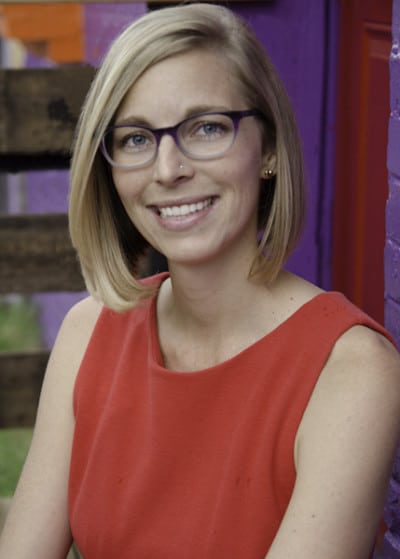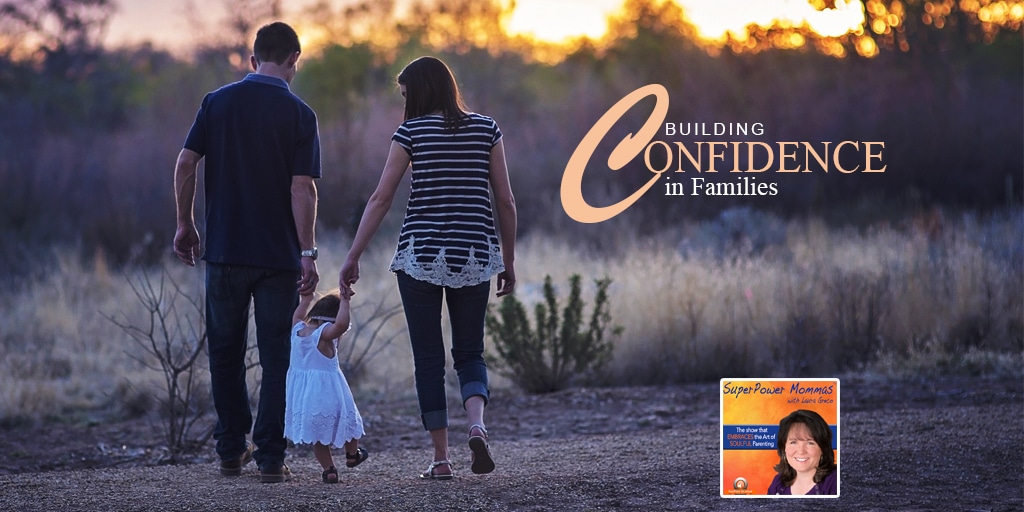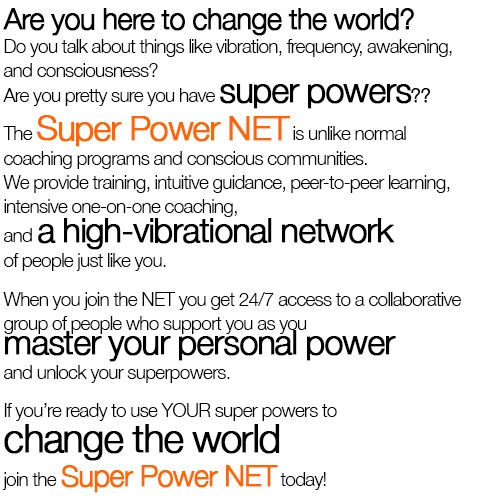
Hello everyone, and welcome to the SuperPower Mommas show. I’m so excited that you are here again, and I am your host Laura Greco. Today, I have a wonderful, lovely guest, Courtney Harris. She is joining me from all the way out in Texas. She’s a lovely woman that I met through networking and a parenting group. She is a life coach for teens and parents. She is actually assisting teens in finding their voice and growing their confidence in thriving, and she encourages the parents of these teens to maintain their own self-care, which also creates an environment of balance and an opportunity to problem-solve in their parenting.
So welcome, Courtney. I’m so excited you’re here, and we are talking on the topic of building confidence in families. So welcome, Courtney.
Hi, Laura. Thanks for having me. I’m so excited about the show and so excited about the ways that you’re sharing these great resources with families.
Aw. Well, I’m so happy to have you here. I’ve had the opportunity to experience on some of your work through our networking. So I’m really excited to have you on this topic that we’re talking about building confidence and families, because it really seems like that is important to your work as well as to all of our work in the parenting-and-child field. But before we begin, what is your superpower, Courtney?

My superpower is to help people, teens, parents.
My superpower … You know what first came to mind when I heard that idea and that question is my gift for advocating for teens and for parents of teens. I think that our society is often describing teens as troubled or as hormonal, or I’m sure as you’re listening, anyone that’s listening can come up with a list of words that we tend to push on to or use to describe teens, and I think they have a pretty bad rap. So, my superpower is to help people, teens, parents, and society at large to reframe that idea, and to really get into a mindset of cherishing the gifts that our teams have and of just loving on them, affirming them, and I really believe that this way of connecting with teenagers could transform so much in our communities and in our society at large.
So that’s my superpower. It’s a pretty big mission. But I’m starting just with loving the teenagers that I get to work with and the teenagers in my life, like my nieces and nephews, and sharing this love and passion with everyone that I get the chance to talk with.
Oh, that’s beautiful. I love that. I love that you’re reframing the attitudes and even the labeling, I would say. There’s a lot of labeling that’s out there now, and I love that you take that and reframe it into something that’s positive and workable in family.
Oh, thank you. Yes, and that’s exactly what it is, right? I’m not saying that, “The teen years are easy breezy.” I’m saying, “Yeah, they are challenging,” and there’s a pathway to finding more peace and ease and really enjoying them as both the teen and as the parents on a much deeper level. So, yeah.
I think about that and your superpower here. How do you see this assisting of the parents and their children? What can you say to that and how that really … What’s the transformation that you see happening in families that you’re working with, with that approach?
Yeah, the biggest, biggest, I guess, end product or … You know, it’s not really ever an end product because we’re always on the journey. But the transformation is deeper connection, deeper understanding. I think that anytime that I work with a family, and I get a sincere head nod from a parent of like, “Oh, yes.” When I see the parents understanding and having maybe even a bit more compassion or a bit more patience with their teenager, like that’s the transformation. Likewise, when I see that from the teen, when I hear a teen explaining, “Oh, I understand why my mom was worried about this,” or, “I understand why this is a big deal to my family,” and they’re gaining a perspective.
They’re getting a broader perspective and starting to understand where their parents are coming from. Really what’s happening is that they’re both meeting each other where they are. So parents are meeting their teens where they are, and teens are beginning to understand where their parents are and what the role is that they may be playing. And of course, this doesn’t always mean that both parties are doing it perfectly that each one may have to learn how to set boundaries and advocate for their needs and things like that, but that’s the journey. It’s the opening of communication, the opening to understanding, and that’s the transformation that I have the pleasure of witnessing when I’m working with families.
Which is beautiful. From my perspective,I raised four daughters of my own, and I’ve studied early childhood education and experienced other families and their being raised. I think that one of the things that really can help families because our audience may have younger children and teens right now is building something even be prior to becoming coming into these teen years. Would you like to say a little more about that?
Certainly, yeah, a great point. It’s really never too early or too young to begin the bonds of open and connected communication, and that’s exactly what it is. It’s taking the mindset, a generous mindset of knowing that your children and your teens have agency in their lives and in the family lives and in their communities. And yes, it starts with things like doing chores and being able to speak up about how they’re feeling and to express their needs, and that ripples out of course to ways that they’re maybe serving in their community through a student council or being active in the church and really beginning to nurture and encourage the ways that children and teens can take responsibility and be, as I said, active agents in their lives and in their family and community lives.
So that’s definitely a piece of it, as well as parents giving a lot of attention and time and patience to open conversations, to being willing to answer questions, or to even say, “Hey, I don’t have the answer,” but being willing to allow your child to ask questions about the world and about life and ensuring that it’s not always met with advice or with concrete answers, but also inviting the child to explore what they believe the possibilities are. So again, that taps into the agency, but it’s also a communication tool, a communication skill.
For example, if a child’s asking a question like, “What does love mean?” You can respond with, “Well, what does it mean to you?” This type of opening space for questions but also allowing for an organic process of discovering together and not treating the role of parenting as the sole expert of the family or of the sole expert of what life is and means … I don’t believe parents ever just intend to take that stance, but we can get busy, and it can be easier to give an answer. So I guess I’m sharing this as an invitation to not be afraid of not having the answer and to let your child consider their possibilities.
Oh, love that. Courtney, what brought you into this work in the first place?
I have been a teacher for 10 years, and my work in the classroom has been so transformational in my own journey. I thought going out of college that I was going to take a break from college for a bit, and I was going to try something new. It turned out I decided to try teaching, and I never went back to what I was originally going to study, which was speech and language pathology to be a speech therapist. But I guess I always had the idea of working with children, and again, it’s interesting the way speech and language pathology has to do with communication.
So yeah, my time in the classroom just gave me the opportunity to connect with students on a daily basis, to see their personal growth throughout a year even throughout a semester just to be able to witness them growing, and to be in a position of affirming them, supporting them, asking them these questions that I encourage parents to ask. It was really a valuable experience for me, so transformational, and every year just kept propelling me into the next. But I also realize that as a highly sensitive, empathic introvert that it was a lot of energy, and that I was really excited to take this work into a smaller setting one on one and small group setting.
So that’s the way that I began to conceptualize my work as a life coach for teenagers.
That’s beautiful. Wow, wow.
Thank you. It was pretty organic, which is exciting.
Yeah, and I love that you noticed that thread of communication and connection is something that you were already on a path of all along, and I love how you beautifully weave that thread of the fact that our teens, of course, there’s an approach, but actually it starts when they’re very young. It’s not that it’s ever too late when they’re teenagers, but it’s great to have that foundation. It just creates more ease and flow in the family understanding of each other, you know?

The teenage brain is truly geared towards looking outside of the self.
Totally, yes. I think the work that I do can start younger than the teen years. You know, the types of communication strategies and everything I share on my blog and my writing. I gear it towards teenagers, but truly, it’s applicable for any pretty much school-age child, most of the topics and most of the strategies. The one thing that I see being different in the teen years is that the teenage brain is truly geared towards looking outside of the self, looking to their social world, to their peers, and there’s a high motivation to what’s going on on the outside.
So that is why it does also become a great time for teenagers to have other people in their support system that are not family members and maybe not even the … I don’t mean to say force, but I guess the … You don’t get to choose your teacher. You have to go to school, and you have these teachers. But to have someone that they, in a sense, get to choose to work with whether it be someone like me as a coach or a therapist, it’s truly very healthy for teenagers to have this non-familial mentor or partner for their journey.
It’s not to say that it diminishes the relationship with their parents. It’s enhancing it, and it’s also teaching them that as they’re becoming their individual self that they do need to advocate for themselves, and they do need to build their own support systems and to find the people that they can rely on to process their life or get new ideas or explore the world.
Love it. Love it, Courtney. We have to take a short break. But before we do, Courtney, could you share with everyone listening where they can find you?
Yes, so pretty simple. It’s CourtneyHarrisCoaching.com. You can also search Facebook for Courtney Harris Coaching as well as Instagram, Courtney Harris Coaching.
Beautiful. Well, you’ve been listening to Courtney and I discussing the confidence in families. We’ll take a short break, and we’ll be right back, and we’re going to dive deeper into the parent connection in this whole process. So, thank you for listening.
To listen to the entire show click on the player above or go to the SuperPower Up! podcast on iTunes.
Music Credit: Words and Music written and performed by David Delmar. Engineered and produced by John Keenan.
Podcast: Play in new window


